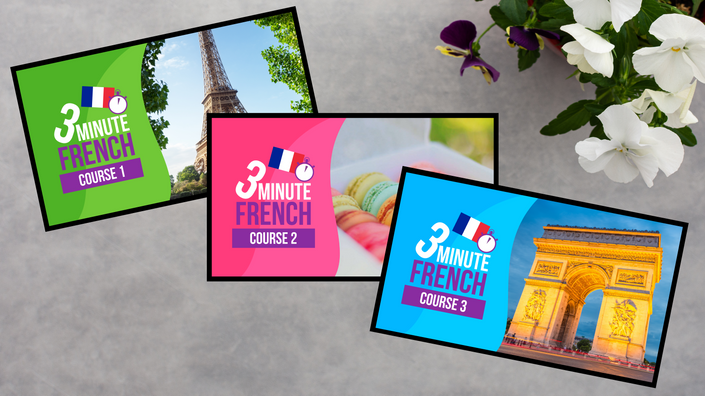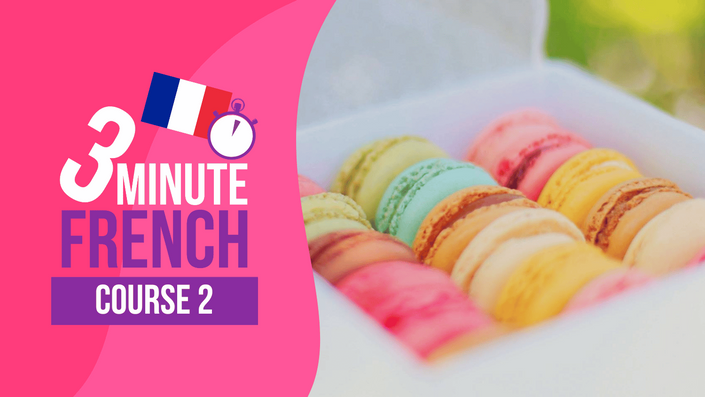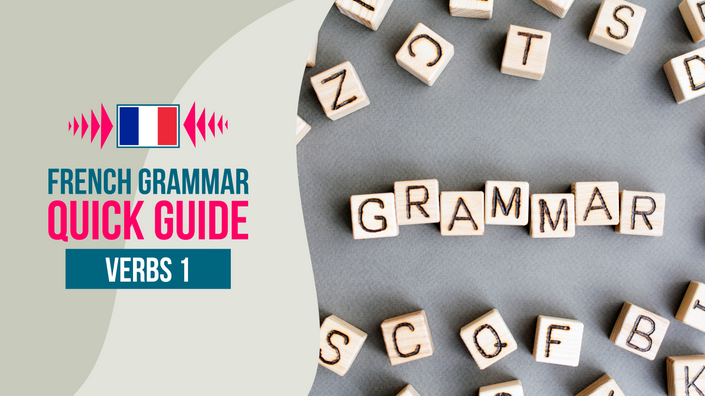
Tiny but huge: de & à
There are two tiny words in French that make a humongous impact
prendre - to take
The literal meaning of the verb “prendre” is “to take”.
je vais prendre ça avec moi – I’m going to take that with me
voulez-vous prendre le bus? – do you want to take the bus?
tu peux prendre la deuxième rue à gauche – you can take the second road on the left
However, when you’re talking about food and drink, you can use “prendre” to mean “to have”
prendre - to have
If you’re talking about food and drink, you can use the verb prendre” to mean “to have”. If you think about it more as being like “intake”, you can imagine that when you eat or drink something, you take it into your body.
au petit-déjeuner, je prends des céréales et des fruits – at breakfast, I have cereal and fruit
je vais prendre un café – I’m going to have a coffee
j’ai pris une boisson et un biscuit – I had a drink and a biscuit
veux-tu prendre un verre? – do you want to get a drink?
If you’re ordering something to eat or drink, a really common way to do it in French is simply to say, “je prends…” followed by what you want. It literally means, “I take…”, but it’s a very common way to order.
moi, je prends un vin rouge, s’il vous plaît – I’ll have a red wine, please
Or, you can also say, “je vais prendre…”, which literally means, “I’m going to have…”
je vais prendre le poulet – I’m going to have the chicken
je vais prendre le plat du jour – I’m going to have the dish of the day
Let’s have a quick look at the present tense and past tense conjugations of the verb “prendre”
PRENDRE – TO TAKE
je prends – I take / I’m taking
tu prends – you take / you’re taking
il prend – he takes / he’s taking
elle prend – she takes / she’s taking
nous prenons – we take / we’re taking
vous prenez – you take / you’re taking
ils prennent – they take / they’re taking
j'ai pris – I took / I’ve taken
tu as pris – you took / you’ve taken
il a pris – he took / he’s taken
elle a pris – she took / she’s taken
nous avons pris – we took / we’ve taken
vous avez pris – you took / you’ve taken
ils ont pris – they took / they’ve taken
avoir - to have
In English, we can use the verb “have” as a way of saying that you’re eating or drinking something:
I’m having a glass of wine
I’m going to have a pizza
I had spaghetti bolognese last night
In French, however, you cannot use “avoir” to mean that you’re eating or drinking. Either you can use the verbs “manger” (to eat) or “boire” (to drink), or, as we discussed above, you can use the verb “prendre”, which literally means, “to take”.
je prends un verre de vin – I’m having a glass of wine
je vais prendre / manger une pizza – I’m going to have a pizza
j’ai pris / mangé des spaghettis à la bolognaise hier soir – I had spaghetti bolognese last night
If you’re not talking about food and drink, however, you can use “avoir” to mean “to have”
Let’s have a quick look at the present tense and past tense conjugations of the verb “avoir”
AVOIR – TO HAVE
j’ai – I have / I’m having
tu as – you have / you’re having
il a – he has / he’s having
elle a – she has / she’s having
nous avons – we have / we’re having
vous avez – you have / you’re having
ils ont – they have / they’re having
j'avais – I had
tu avais – you had
il avait – he had
elle avait – she had
nous avions – we had
vous aviez – you had
ils avaient – they had
Let’s have a look at a few example sentences using different forms of “avoir”
il a une grande maison – he has a big house
elle a beauoup de livres – she has lots of books
Pierre a une très forte personnalité – Pierre has a very strong personality
ils ont deux filles et un fils – they have two daughters and a son
nous avions une maison à la campagne – we used to have a house in the country
Can I have two coffees?
If you’re ordering yourself a coffee, in French, you ought to use the verb “prendre”
Puis-je prendre un café? – Can I have a coffee?
But, if you want to order two coffees, you can use “avoir”. Why? Well, the verb “prendre” is used if you’re ordering something you’re going to eat or drink yourself. However, if you’re ordering two coffees, at least one of them is most probably for somebody else, so you can use the verb “avoir” rather than “prendre”, since you’re not going to be intaking both of them
Puis-je avoir deux cafés? – Can I have two coffees?
Now, don’t worry if you get these verbs wrong; you’ll still be perfectly understood. However, if you’d rather avoid them altogether, just say this:
Deux cafés, s’il vous plaît – Two coffees, please
Get three courses in one bundle, and save money
-

Courses 1, 2 & 3
Get this bundle -

Courses 4, 5 & 6
Get this bundle -

Courses 7, 8 & 9
Get this bundle
Course 2, Building Structures and grammar courses
-

Course 2
Get this course -

Building Structures
Get this course -

Quick Guide
Get this course
All my French courses

Building Structures in French
Quick Guides
French grammar
Essential French grammar - Future | Conditional | Imperfect
All my Spanish courses

Building Structures in Spanish
Quick Guides
Spanish grammar
Essential French grammar - Future | Conditional | Imperfect
All my German courses

Building Structures in German
Quick Guides
German grammar
Essential French grammar - Future | Conditional | Imperfect
All my Italian courses

Building Structures in Italian
Quick Guides
Italian grammar
Essential French grammar - Future | Conditional | Imperfect
All my Portuguese courses

Building Structures in Portuguese
Quick Guides
Portuguese grammar
Essential French grammar - Future | Conditional | Imperfect






